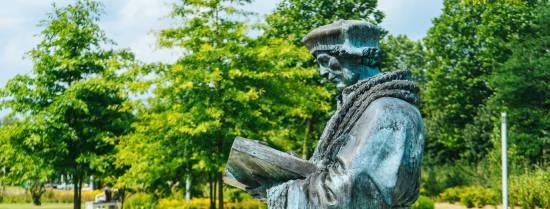Desiderius Erasmus Roterodamus, born in Rotterdam, was a philosopher, theologian and humanist. With his books, he had a great influence on the cultural and intellectual climate. Erasmus was a world citizen: he believed it was important for people to treat other people, the world and themselves with care and attention.
Inspired by the ideas of our namesake, we give shape to our identity, our thinking and actions. We summarise this under the heading 'being an Erasmian'. This stands for global citizenship, social commitment and an open and critical mind-set. Last but not least, it also stands for how we do it: enterprising, innovative and from the diversity of backgrounds and opinions, always connecting and cooperating, action-oriented and, where necessary, unconventional and with guts. We proudly call this 'how' the Erasmian way.
In the spirit of Erasmus - world citizen and namesake of our university - our students, researchers, educators and alumni come to new scientific insights. They devise solutions to societal challenges on a regional and global scale. In this constant search for solutions, we step outside the boundaries of countries and disciplines, embracing a cosmopolitan world view. We tap into our international networks to build alliances and gain knowledge and inspiration.
Social impact also means connection, movement towards each other and cooperation. It means building bridges between different disciplines, in cooperation with society. A tradition of dialogue is inherent to this. Students are trained to be experts in their own field or in a multidisciplinary context. They are equipped with the knowledge and insights they need to make connections. The research we do and the education we provide is interdisciplinary and multidisciplinary. It builds on our solid foundation of monodisciplinary knowledge and expertise. This is supported by new, co-creative and inclusive ways of working (together). Connections are an integral part of how we think and work.
Building on the legacy of our founders, our university is characterised by an entrepreneurial spirit: a can-do culture focused on results, experimentation and innovation. We are not afraid to go off the beaten track from time to time, daringly and sometimes unconventionally. Within our shared values, we build bridges between past inspiration and current challenges. Our students, teachers and researchers play an active role in the way research and knowledge are put into practice. We are as committed to experiment and innovation as we are to our own research and teaching. We accept ownership and take responsibility.
Erasmus was a tireless champion of freedom and tolerance. We encourage our community to participate in the academic debate from its strengths, talents and background. Our students and staff reflect our international and multicultural environment - we believe in the power of inclusion. We have a tradition of independence and integrity, striving for mutual understanding across social and cultural divides. Our students develop the knowledge and competences they need to properly assess different viewpoints and opinions. The academic staff sets a good example and stimulates vigorous debate. As a community, we are open to a broad view of social, political and ethical dilemmas. Views, generally accepted norms and personal values are discussed and critically examined in dialogue.

As a university, we feel called to help solve the complex problems of modern society. Impact' implies social commitment. It also implies a commitment to egalitarian and democratic values, to inclusion and a culture of dialogue and discussion. It appeals to commitment to research and education that have a real impact in the region, in our country and in the world. Our students and staff subscribe to the fundamental principles of social commitment and equal opportunities.